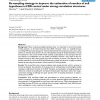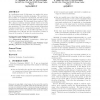653 search results - page 18 / 131 » Using common random numbers for indifference-zone selection |
BMCBI
2007
13 years 7 months ago
2007
Background: When conducting multiple hypothesis tests, it is important to control the number of false positives, or the False Discovery Rate (FDR). However, there is a tradeoff be...
ICPR
2008
IEEE
14 years 8 months ago
2008
IEEE
Semi-supervised clustering allows a user to specify available prior knowledge about the data to improve the clustering performance. A common way to express this information is in ...
ICASSP
2011
IEEE
12 years 11 months ago
2011
IEEE
State-of-the-art speaker verification systems consists of a number of complementary subsystems whose outputs are fused, to arrive at more accurate and reliable verification deci...
KDD
2009
ACM
14 years 8 months ago
2009
ACM
Online forums represent one type of social media that is particularly rich for studying human behavior in information seeking and diffusing. The way users join communities is a re...
GECCO
2007
Springer
14 years 1 months ago
2007
Springer
In a preliminary part of this paper, we analyze the necessity of randomness in evolution strategies. We conclude to the necessity of ”continuous”-randomness, but with a much m...


